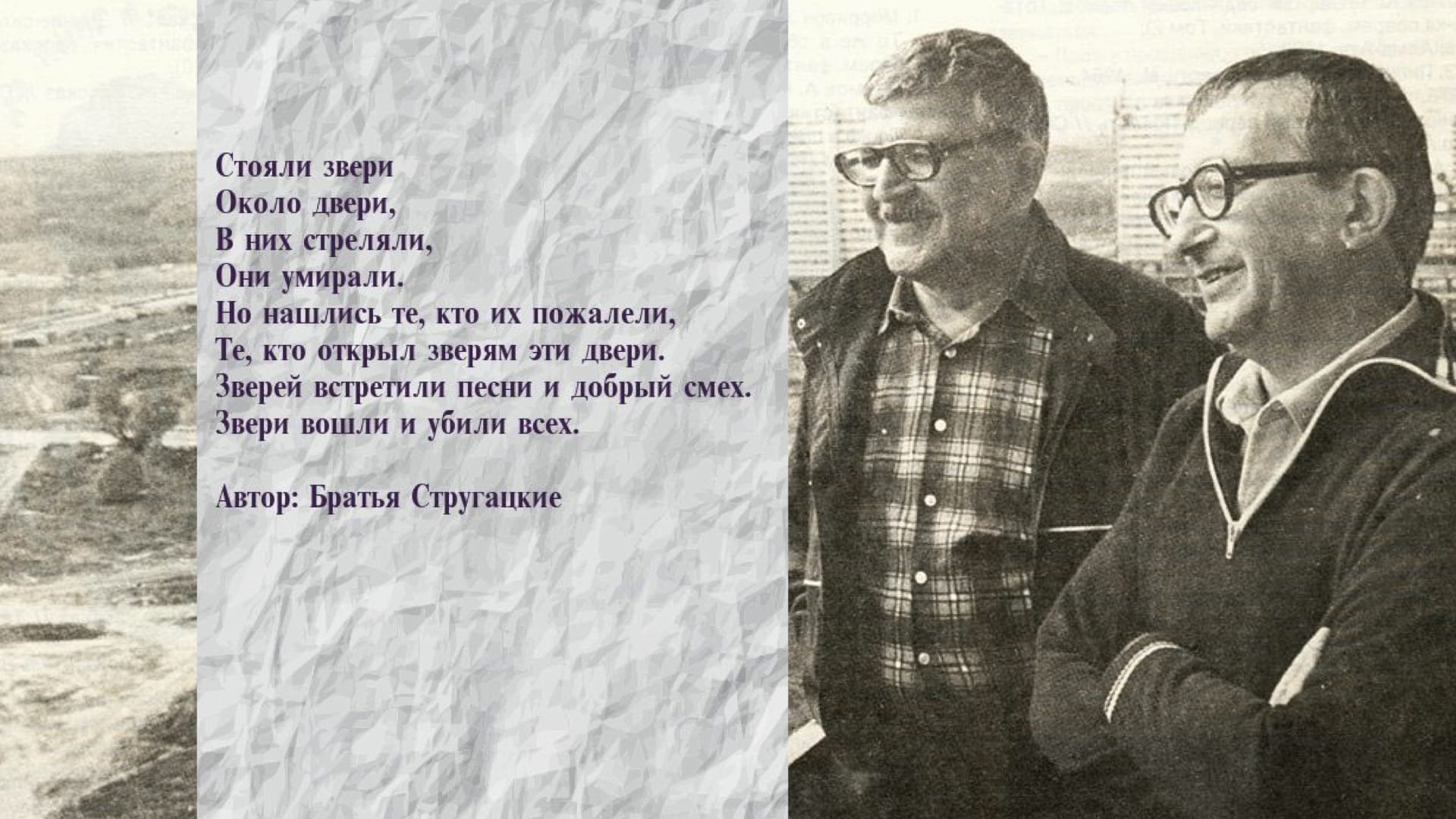In October 2023, many social media users published a poem attributed to Soviet science fiction writers. We checked whether there is any reason to consider the Strugatskys as the authors of this text.
The poem is given as follows:
The animals stood
Near the door
They were shot at
They were dying.
But there were those who took pity on them,
Those who opened these doors to the animals.
The animals were greeted by songs and good laughter.
The animals entered and killed everyone.
The text was widely disseminated due to the escalation of the Arab-Israeli conflict after the attack by the Hamas group, recognized as terrorist in many countries, on Israel on October 7. Internet users draw an analogy between the plot of the poem and reality, while the text is used both to express a pro-Israeli position and to explicitly anti-Israel context, and just in xenophobic publications out of direct communication with a news agenda. In the majority posts On Facebook, the authors are listed as the Strugatsky brothers, some add that the science fiction writers composed only the first four lines, and the author of the ending is musician Vis Vitalis. Some users generally claimthat this is a translation (although they do not indicate from which language and who the author was). On the social network X (formerly Twitter) one of the popular tweets with this poem dialed 180,000 views, 480 retweets and 3,700 likes. The text also spread on Telegram: blogger Yigal Levin published it twice in his channel without attribution - in Russian (132,000 views) and in translation into Hebrew (116,000). In some channels, authorship, like on Facebook, attributed brothers Strugatsky, in others - Boris Strugatsky's son Andrei, who allegedly composed the first four lines as a child, and the rest as an adult.

Arkady and Boris Strugatsky, as well as Andrei Strugatsky, the authorship of this poem attributed to already not the first year. But this is incorrect. The history of the first four lines described Boris Strugatsky in the biographical book “Comments on the Past” (2003), published after the death of his brother and co-author:
“It all started with the fact that a long time ago, in very immemorial times, the young son of BN (Boris Natanovich - Ed.), unexpectedly for himself and for those around him, suddenly composed a counting song:
The animals stood
Near the door
They were shot at
They were dying.Shouting out these strange and outlandish, unchildish poems in different tones, he rushed around the apartment, and BN looked at him and thought: “Damn it, what wonderful words! What a clever idea, you brat. An excellent epigraph could come out for something!..” And his imagination drew some vague pictures... some terrible and unfortunate monsters... tragically lonely and no one necessary... ugly, suffering, looking for human affection and help, but instead of all this receiving a bullet from frightened people who do not understand anything.”
This quatrain inspired the writers and was supposed to become the epigraph to the story, the working title of which the Strugatskys chose “The animals stood near the door.” However, the editor was against both the title and the epigraph, and as a result the story was published under the title “The Beetle in the Anthill.” In the first editions, the poem was preserved only in the text itself, as Boris Strugatsky notes, “in a mutilated form.” After the collapse of the USSR in reissues and on a website dedicated to the work of writers, the epigraph was returned into the text of the story.
There are no traces of the second quatrain in the works of the Strugatsky brothers. And the text itself raises questions - its two parts do not have the same size, the lines of the second fragment are twice as long, and the “door” turns into “doors”. Search according to the quote leads to records dated October 29, 2009 in the LiveJournal of musician Vis Vitalis, where he reports that this is fan fiction (a work based on) the work of the Strugatskys.

In Vitalis’ fanfiction, the very meaning of the original text changes: the humanistic pathos and danger emanating from man, which Boris Strugatsky describes in his memoirs, is replaced by a very definite morality - “a beast is a beast.” Nevertheless, precisely in this form, including openly xenophobic context, the text became popular and began to spread in the mid-2010s with most with different attributions - from the Strugatskys and Vitalis to the bard Sergei Nikitin.
Andrei Strugatsky, the son of the youngest of the duo of Soviet science fiction writers, began to be attributed the authorship of all eight lines no later than 2017 year, and on December 30, 2018 it was posted on YouTube recording reading this text - the description of the video indicates that this is a poem by the son of Boris Strugatsky. When it began to spread again in 2023, Andrei Strugatsky wrote on his Facebook page, which has nothing to do with the second part of it.
Thus, the viral text consists of two parts written by different authors. The first four lines, which became the epigraph to the story “The Beetle in the Anthill,” were composed by Andrei Strugatsky, the son of one of the writer brothers. The most likely author of the second part of the poem, which significantly distorts the message of the original work, is musician Vis Vitalis.
Cover photo: collage “Checked”
- Arzamas. Philosophy of the Strugatskys
- Did Remarque say: “In dark times, bright people are clearly visible”?
If you find a spelling or grammatical error, please let us know by highlighting the error text and clicking Ctrl+Enter.






